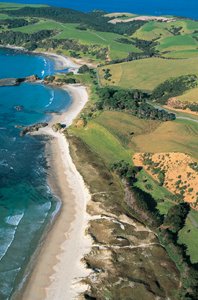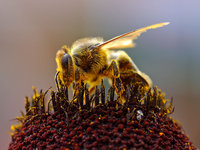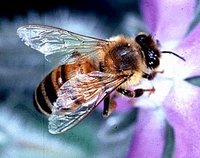Creature Comforts
 In stark contrast to the reasonably well-behaved conditions that were present during our last visit to Tawharanui, this time my family and I found ourselves hunkering down for the lightning and hail storms that had been forecast. Fortunately, neither of those things eventuated, but the overall nature of the holiday in my mind was still completely different to that of the prior adventure. I found myself instilled with an alternative set of goals. Now I was not there "merely" to appreciate the natural wonders of the sanctuary, but also to begin finding myself again after the onset of a massive identity crisis, brought on indirectly by the turning of the year. It appears to be the case that, cushioned in all the bourgeois complacency that I had developed with who I had become during the course of 2005 -- as exhibited in my last post of the year -- I had forgotten that I was in fact still partaking in the venerable task of finding myself. Hence, in retrospect of the past week, I guess this shock is something of a harsh return to reality more than anything.
In stark contrast to the reasonably well-behaved conditions that were present during our last visit to Tawharanui, this time my family and I found ourselves hunkering down for the lightning and hail storms that had been forecast. Fortunately, neither of those things eventuated, but the overall nature of the holiday in my mind was still completely different to that of the prior adventure. I found myself instilled with an alternative set of goals. Now I was not there "merely" to appreciate the natural wonders of the sanctuary, but also to begin finding myself again after the onset of a massive identity crisis, brought on indirectly by the turning of the year. It appears to be the case that, cushioned in all the bourgeois complacency that I had developed with who I had become during the course of 2005 -- as exhibited in my last post of the year -- I had forgotten that I was in fact still partaking in the venerable task of finding myself. Hence, in retrospect of the past week, I guess this shock is something of a harsh return to reality more than anything.One of the last things that my family did before leaving Tawharanui following our earlier visit was go for a walk along the "Ecology Trail" that does a loop along the coastline and through the bush, starting and finishing at Anchor Bay (although we took a shortcut that skipped the coastline section that time, due to the fact that my mother and aunt are not capable of walking that route). It was a truly heartening experience that I will not forget for some time to come. We had been warned beforehand that part of a bees' hive had fallen onto the bush track and that people were being advised to proceed with caution. The warnings didn't actually give one an idea of exactly how many bees were present in the forest, and how many were involved in the operation of retrieving the honey from the fallen honeycomb. It had to be seen to be believed. The phenomenon, to which words will never truly do justice, no doubt, was inspirational evidence that the sanctuary concept really works -- a positively prosperous empire of innumerable wild bees spread throughout the Tawharanui rainforest. One couldn't go anywhere in the shady oasis without hearing the constant drone of tiny transparent wings beating furiously, or without seeing the bees seemingly gliding spread-legged in majestic formation over the track, commuting between rich tea trees in their neverending labour of nectar collection.
 You can understand how internally distraught I was when I overheard the friendly ranger Graham explaining to my parents that there had been some further developments in the situation. Apparently, during our absence another section of the hive had fallen down from the trees, causing the bees to become even more -- allegedly -- "instrusive" onto the track. That event had, by sheer coincidence, been followed by a massive branch falling off of a nearby tree in the vicinity of the hive -- and when I say a massive branch, I mean practically a secondary trunk extending out of the side of the tree. It was massive. The naturally-occurring wound to the probably-ancient puriri had caused a gaping hole in the forest canopy to open up, bathing the usually-gloomy area in shafts of life-giving sunlight. The disintegration of the monolithic plant will be of future benefit to the rainforest, as it will allow the small plants that have until now been subjugated to growing on the forest floor to properly mature. However, it had enraged the already-techy bees and the point had been reached where they were posing an apparently unignorable threat to passing bushwalkers.
You can understand how internally distraught I was when I overheard the friendly ranger Graham explaining to my parents that there had been some further developments in the situation. Apparently, during our absence another section of the hive had fallen down from the trees, causing the bees to become even more -- allegedly -- "instrusive" onto the track. That event had, by sheer coincidence, been followed by a massive branch falling off of a nearby tree in the vicinity of the hive -- and when I say a massive branch, I mean practically a secondary trunk extending out of the side of the tree. It was massive. The naturally-occurring wound to the probably-ancient puriri had caused a gaping hole in the forest canopy to open up, bathing the usually-gloomy area in shafts of life-giving sunlight. The disintegration of the monolithic plant will be of future benefit to the rainforest, as it will allow the small plants that have until now been subjugated to growing on the forest floor to properly mature. However, it had enraged the already-techy bees and the point had been reached where they were posing an apparently unignorable threat to passing bushwalkers. So humanity took it upon themselves to murder that entire glorious empire and destroy everything that the bees had accomplished in the form of a thriving forest-wide plant gamete transfer system and a hive over two metres long. That terrific testament to nature's ingenuity of perfection, to the prosperity and the soul of the rainforest, was not to be tolerated as long as it might possibly pose any kind of threat to humans. It would seem possible that despite the fact that Tawharanui is supposed to be a sanctuary for wildlife, people still ultimately take priority. This reinforces my confidence in my quiet ponderences as to whether the peninsula has truly been fortified from introduced mammalian pestilence primarily in the interests of the native flora and fauna, or rather more with the intention of maintaining some kind of amusement park for humans. My idea is also backed up by the irreverant attitudes towards nature shown by many of the campers -- including, I am pained to say, my own Earth-raping family, who insist on hammering harmless spiders into the ground with tent pegs; and also those utter bastards who set off fireworks near the dune systems in the middle of the night. Graham said it was unfortunate that the bees had had to be exterminated but explained that it was likely some of the workers would limp off to found a new colony somewhere. Nonetheless I strongly believe that the reasonable, ethical thing to do would have been to close the track to public traffic and let nature and the hopefully-good-natured anti-pest ranger force go about their business in the forest.
So humanity took it upon themselves to murder that entire glorious empire and destroy everything that the bees had accomplished in the form of a thriving forest-wide plant gamete transfer system and a hive over two metres long. That terrific testament to nature's ingenuity of perfection, to the prosperity and the soul of the rainforest, was not to be tolerated as long as it might possibly pose any kind of threat to humans. It would seem possible that despite the fact that Tawharanui is supposed to be a sanctuary for wildlife, people still ultimately take priority. This reinforces my confidence in my quiet ponderences as to whether the peninsula has truly been fortified from introduced mammalian pestilence primarily in the interests of the native flora and fauna, or rather more with the intention of maintaining some kind of amusement park for humans. My idea is also backed up by the irreverant attitudes towards nature shown by many of the campers -- including, I am pained to say, my own Earth-raping family, who insist on hammering harmless spiders into the ground with tent pegs; and also those utter bastards who set off fireworks near the dune systems in the middle of the night. Graham said it was unfortunate that the bees had had to be exterminated but explained that it was likely some of the workers would limp off to found a new colony somewhere. Nonetheless I strongly believe that the reasonable, ethical thing to do would have been to close the track to public traffic and let nature and the hopefully-good-natured anti-pest ranger force go about their business in the forest.I do not for one moment deny the potential for huge emotional, psychological and spiritual enrichment to be experienced by humans as a result of being involved with a pristine natural environment. I think it's a great immaterial resource for us to have at hand. But if we are serious about creating such living, breathing multi-organism entities, then we really have to start putting other species before ourselves, for once. Perhaps the reason for the murder of those bees, along with the countless other heinous compromises that have no doubt been committed by conservation groups all over the planet, is that humanity has become too used to crafting its circumstances to suit itself. Perhaps it is time that we considered doing what all life is intended to do, and adapt in order to overcome the natural adversities that we face. At the very least, individuals apparently working to save Earth's ecosystems should at this early stage accept the inherent benefits to humanity as perks and nothing more. Otherwise, I do not believe it can be legitimately argued that they are acting in the interests of the natural world as opposed to out of self-interest.


5 Comments:
See, you're putting us before them. It's not about whether humans will miss the bees. It's the fact that something great had been achieved by nature over a long period of time and we just came along and destroyed it entirely with our own interests in mind.
My room is full of spiders because it's the only place in the house where they're not going to be wantonly murdered, so whenever I find one in the house I catch it and release it into my room.
ever wondered how many spiders you've eated while sleeping?
sleep on that
To be eaten alive by another spider is a natural and honourable way to die, unlike being pointlessly squashed flat by a human's shoe. The latter event is not only an anti-climactic end for a spider, but it is a waste of biomatter. At least when something gets eaten its tissue is being put to good use.
I don't care how many spiders I've apparently consumed while sleeping because as far as I'm concerned that's a natural process as well. The same thing has probably been happening for millions of years involving other mammals.
Bees are achievers. They play the very important role of pollinating plants. This is particularly crucial in a rainforest like the one at Tawharanui where the bird population is far from being back to its pre-humanity numbers. The bees had constructed a two-metre-long hive which means they would have been extremely effective at their task.
I'm of the opinion that humanity's reached the point where it should be intelligent enough to overcome its allegedly-natural urges to destroy things for no good reason. Unfortunately everyone still seems to act on impulse.
A crane fly flew into the hot bulb of my bedside lamp and was killed a few weeks ago, and it's still lying behind my dresser where it fell. I think that's a waste. The same thing would result if I ground a harmless daddy longlegs into the carpet.
I don't know about that. The crane fly's still fully intact and it's been there since before my second trip to Tawharanui.
Killing the bees because they are potentially harmful to people when disturbed is not a good reason. It basically establishes that the forest is "protected" in the interests of humanity's enjoyment rather than the animals' prosperity. I would've happily been told not to go into that forest again if it meant that those bees would have been spared.
Post a Comment
<< Home